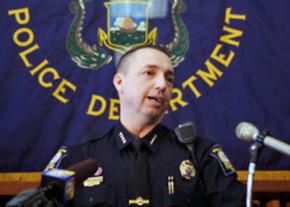How do we honor Chance Baker’s life?
The responses of city officials in Portland, Maine, to another case of police violence doesn't deal with the core issues, write , and .
ON FEBRUARY 18, police in Portland, Maine, were called to the Union Square Shopping Plaza on St. John Street in the low-income neighborhood of Libbytown, where 22-year-old Chance Baker, a homeless Black man, was allegedly waving a pellet gun and pointing it at cars and passersby.
When officers arrived, they told Baker to put the gun down, and he complied. Baker then began to make moves to reach back down for the gun--and without warning, Sgt. Nicholas Goodman, an officer who killed another man in 2008, shot Baker in the forehead, killing him.
While there are differences between eyewitness accounts and the official police story, both agree there was no verbal warning before Goodman opened fire. But police claim their officers didn't know Baker was holding a pellet gun, though people at the scene say that fact was made known the initial emergency call.
A memorial vigil held in Monument Square a week later drew a crowd of about 50 people, though organizers emphasized that this wasn't a political event.

PORTLAND'S MAYOR and the City Council responded to this tragedy with talk about how it could have played out differently if police body cameras had been in use.
Two days prior to the shooting, Mayor Ethan Strimling laid out a plan to "fast track" police body cameras, moving up the full rollout from June 2019, but only to some point in 2018, and he isn't for speeding things up after Baker's killing. This is from a mayor who claimed, after the arrest of Black Lives Matter protesters in the Old Port on last July, that "we don't have police brutality in Portland, and that's a good thing--we want to make sure that continues."
Progressive Portland, an organization focused on electing progressive Democrats, and the ACLU, have put out statements calling for body cameras to be implemented immediately.
But on the other side is Portland Police Chief Michael Sauschuck, who declared three days after Baker's death: "There have been individuals and organizations that seem to have used this particular incident as a platform to further an agenda...I am saddened, I'm disappointed, and I'll tell you I'm disgusted by any use of a tragedy to further some kind of political agenda around body cameras."
So there is resistance to even this measure, which has proved to be far from effective in curbing police violence. In Maine, police video, like the personnel records of officers, is protected by law from public review. This law presently applies to dashboard cameras and would apply to body cameras as well.
While the ACLU and groups like Progressive Portland advocate for body cameras, the fact remains that the murders of Eric Garner, Philando Castile, Tamir Rice and others were captured on video, and the police responsible weren't found guilty of any wrongdoing. In a society where police can be caught on camera killing people and still face no repercussions, body cameras certainly aren't a guarantee that violence will even slow down.
Maine hasn't been exempt from the epidemic of police violence around the U.S. A study by the Portland Press Herald concluded that of the 101 police shootings in Maine between 1990 and 2012, not a single officer was found guilty of wrongdoing. In this latest case, there is no sign that the officer who shot Baker will even face charges.
Some have speculated that perhaps this was a case of "suicide by cop." Yet Goodman is specifically trained in de-escalation tactics--he is the field training officer for the Portland Police Department.
In fact, Chief Sauschuck told reporters at a press conference that he essentially expects his officers to shoot to kill when they use a weapon. "I'm not training them to, nor do our policies and procedures state that they should wound somebody," Sauschuck said. "They are trying to hit this individual in a lethal location."
Meanwhile, Black Lives Matter activists arrested for protesting police violence last year are still on probation. The result of their nonviolent dissent was an effectIVE gag order that hampers them from taking part in political activism.
By contrast, Sgt. Goodman is getting a paid vacation for ending a life.
ACCORDING TO friends, Chance Baker was working three jobs while being homeless. His situation is becoming more and more normal in a city undergoing rapid gentrification of low-income and working-class neighborhoods and a building spree bringing luxury condos and a bigger tax base, but providing no place for the working class to go.
Sauschuck said, apparently without irony, "Somebody lost their life in our community, and we give our condolences to the entire Baker family." But Libbytown isn't his community, nor that of his officers. Portland's low-income neighborhoods are policed by officers who don't live there and who have disdain for those who do.
The police don't serve or protect people like Chance Baker. They didn't help Chance find housing or financial security, nor did the city government. In this regard, Portland is no different from the rest of the U.S. We live in an economic system that doesn't value human life and sees it, particularly if it falls into marginalized identities, as being expendable.
To honor Chance Baker, we need to organize against this system and the violence it produces, with the aim of stopping tragedies like this from every happening again.


